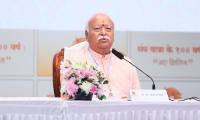The cloud of uncertainty hanging over the fate of 4 per cent reservation in educational institutions for the backward groups of Muslim minority in Andhra Pradesh has finally been cleared by the Supreme Court.
In its interim order passed on Tuesday, the Supreme Court has allowed Andhra Pradesh to give admission to students under BC "E" category in professional colleges including medical and engineering colleges.
The apex court said that only those students who have completed the counseling process should be admitted under the 4 per cent quota and their admission should be subject to the final verdict of the Andhra Pradesh High Court in the reservation case.
The Supreme Court passed the verdict on a petition of the state government seeking the vacation of stay order issued by the high court against 4 per cent reservations for backward Muslim groups last year.
Earlier the Supreme Court had granted permission to the state government to go ahead only with the counseling of backward Muslim students but not to give them the admission. The latest interim order has removed that obstacle and the colleges can now start accepting the students in accordance with the merit list and counseling process by the state government.
Under the reservation quota Muslim students, other than Syeds, Moghuls and Pathans, are likely to get admission on 153 medical, 51 dental and 3,400 engineering seats. The Muslim students, who have qualified in the common entrance tests will also get admission on 1,040 MBA and MCA seats and 120 seats in pharmacy colleges.
They had got admission on same number of seats in the last academic year but after that the high court had stayed the implementation of the order.
The interim order has come at a time when the a seven judges bench of the state high court is hearing a batch of petitions filed challenging the legal and constitutional validity of the state's act providing reservations to 15 backward groups of Muslims.
The state government had passed the legislation to provide reservations to Muslims on the basis of AP Backward Classes Commission Report on the socio economic conditions of different groups of Muslim minority in the state. But the same was challenged by a batch of petitioners in the high court last year.
A three-member bench heard the case for a few months and later transferred it to a seven-member bench headed by Chief Justice A R Dave.
It may be recalled here that the Congress party in its election manifesto before 2004 poll had promised 5 per cent reservations to the Muslim community in government jobs and educational institutions. But two attempts of Y S Rajasekhara Reddy government in 2004 and 2005 failed as the high court and Supreme Court quashed its orders and legislation on the issue.
Keeping in view the objections raised by the courts on two occasions, the state government passed another legislations in 2007 reducing the quota to 4 per cent so that the total reservation does not cross 50 per cent ceiling. Instead of providing the reservations to the entire Muslim community, it restricted it to the 15 backward groups of the community excluding the creamy layer (the families whose annual income is more than Rs 2.4 lakh). Certain groups of Muslims including Syed, Pathan and Moghul were excluded from the benefit of reservation due to their better socio economic conditions.
Interestingly the 4 per cent quota was challenged only in education and not in the jobs. Consequently the government has recruited Muslims in its jobs under the quota.








